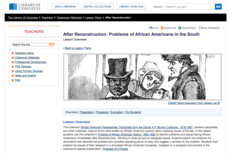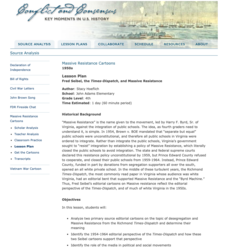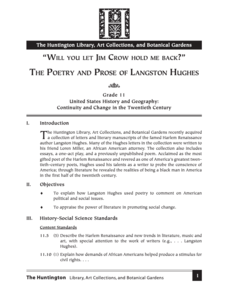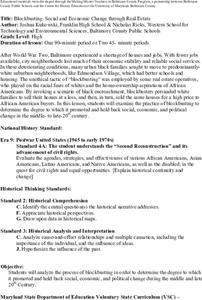Curated OER
Perseverance
Young scholars examine how the failure of Reconstruction led to the systematic passage of Jim Crow laws in states across the South and the negative impact these laws had on the growth and development of the US.
Library of Congress
After Reconstruction: Problems of African Americans in the South
Lynchings, race riots, and Jim Crow laws were just a few examples of antagonism that African Americans faced after Emancipation. Class groups investigate these and other events, and prepare a presentation to inform the class about the...
EngageNY
Grade 11 ELA Module 2: Unit 1, Lesson 12
Readers closely examine paragraph nine in Du Bois's "Of Our Spiritual Strivings" to understand prejudice's meaning and research Jim Crow laws.
Roy Rosenzweig Center for History and New Media
Fred Seibel, the Times-Dispatch, and Massive Resistance
A lesson plan challenges scholars to analyze editorial cartoons created by Fred Seibel, illustrator for the Times-Dispatch, during the Massive Resistance. A class discussion looking at today's editorial pages and Jim Crow Laws leads the...
Curated OER
Integration of Education
High schoolers explore the history of Civil Rights and how the struggle for Civil Rights and the Second Reconstruction, transformed society and politics in the United States in the 1950s. Then they identify why American Schools are...
Curated OER
Making Democracy Work for Everyone, 1877-1904
Students investigate the culture of the post Reconstruction South. They participate in a jigsaw research activity, conduct Internet research on an assigned topic, and write a report to present to the class.
Huntington Library
The Poetry and Prose of Langston Hughes
Eleventh graders discover the poetry of Langston Hughes. In this social issues lesson plan, 11th graders experience the views of Langston Hughes. Students read Hughes' poetry and discuss the basic theme. Students evaluate the political,...
National Woman's History Museum
Women's Suffrage Movement
The National Women's History Museum offers a 20-slide presentation that details the history of the Women's Suffrage Movement from its creation in the 1830s through the passage of the Nineteenth Amendment in 1920.
Center for History Education
Blockbusting: Social and Economic Change through Real Estate
"Redlining," "Blockbusting," and "White Flight" may not be terms familiar to young historians. Here's a lesson that introduces middle schoolers to these terms and the actions associated with them. Class members examine a series of...
Curated OER
The Great Migration: Comparing and Contrasting Northern Life to Southern Life
Students research the Great Migration of African-Americans to the North and form an opinion as to whether this migration was beneficial to its participants. They, in groups, research various experiences and debate the topic.
Curated OER
Reconstruction: "Healing Wounds, Mending Fences"
Students examine material on the Civil War Era to develop an understanding of the major issues that were resolved. This six lessons unit provides a closer glimpse into our nation's political and ethical history.
Facing History and Ourselves
Civil Rights Historical Investigations
The murder of Emmett Till, the Selma to Montgomery march, and the desegregation of Boston schools are the focus of three units that ask class members to investigate why these events were so key in the struggle for civil rights. Groups...
Roy Rosenzweig Center for History and New Media
Reconstruction
When slavery ended, what did the government do to help African American during Reconstruction? An interesting instructional activity uses primary sources such as newspaper articles to help scholars analyze Reconstruction policies and how...
National Park Service
Civil War to Civil Rights: From Pea Ridge to Central High
Explore how the Civil War impacted the Civil Rights Movement. Class members complete a series of projects for a unit that uses a layered curriculum approach to learning.
Core Knowledge Foundation
The Civil War
A unit covers many aspects of the Civil War. Over six weeks, fifth graders delve deep into the history of slavery, the Civil War—before, during, and after—Abraham Lincoln, women's contributions, the Emancipation Proclamation, and...
Curated OER
Land, Liberty and the Struggle for the American Dream
Students investigate equality by reading a historical fiction book in class. In this civil rights lesson plan, students read the story Roll of Thunder, Hear my Cry with their classmates and define the Jim Crow Laws that kept blacks...
Curated OER
Racism, Discrimination, and the Law
Seventh graders examine the various racism and discrimination faced by various ethnic groups in the United States. In groups, they research the legal system and describe the purpose of the United States Constitution. They review cases...
Center for History and New Media
The Daily Experience of the Laurel Grove School, 1925
What was daily life like for those attending segregated schools in 1925? Modern learners fill out a KWHL chart as they explore historical background and primary source documents about the Laurel Grove School in Fairfax County, Virginia....
C-SPAN
14th Amendment Equal Protection Clause
Two Supreme Court cases, Plessy v. Ferguson and Brown v. Board of Education take center stage in a lesson about the Equal Protection Clause of the 14th Amendment. Class members research both cases to compare and contrast the rulings.
Curated OER
Separate is Not Equal: Brown v. Board of Education
Students analyze photographs that feature segregation. In this human rights lesson, students examine photographs of a segregated movie theater, a Ku Klux Klan gathering, a segregated business sign, and an illustration from "Harper's...
Judicial Learning Center
Civil Rights and Equal Protection
Almost every American is familiar with the Supreme Court case of Brown vs. Board of Education. Far fewer understand the constitutional reasoning or the wide-ranging consequences of the ruling in the field of criminology. The interesting...
EngageNY
Studying Author’s Craft: Carlotta’s Journey
The longest journey begins with a single step. Scholars analyze the details of Carlotta Walls LaNier's journey through the desegregation of schools in the United States. They continue reading the author's memoir, A Mighty Long Way and...
EngageNY
Preparation for End of Unit Assessment: Making Connections between Song Lyrics and Texts, Part 1
Song lyrics can help people better understand literary texts. Scholars continue listening to "Ain't Gonna Let Nobody Turn Me Around" and discuss the connections between the song's lyrics and Carlotta Walls LaNier's memoir, A Mighty Long...
EngageNY
Preparation for End of Unit Assessment: Making Connections between Song Lyrics and Texts, Part 2
Five hundred schoolchildren first performed the song "Lift Every Voice and Sing" in 1900 to celebrate President Lincoln's birthday. Scholars listen to the historic song and discuss the lyrics with partners. They continue preparing notes...
Other popular searches
- Jim Crow Laws 1900s
- Segregation Jim Crow Laws
- Jim Crow Laws 1866
- Law Jim Crow
- Jim Crow Laws Reconstruction
- Jim Crow Laws History
- Segragation Jim Crow Laws
- Jim Crow Laws Worksheet

























